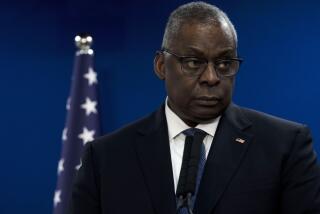Yeltsin, Ill With Respiratory Bug, to Be Hospitalized for Up to 12 Days
MOSCOW â Boris N. Yeltsin was hospitalized Wednesday with a viral respiratory infection that will keep the 66-year-old Russian president in bed for 10 to 12 days, aides said, an anxiety-producing announcement that quickly knocked up to 4% off the value of financial markets here.
âDoctors donât rule out that it [the infection] could develop into flu,â said Kremlin spokesman Sergei V. Yastrzhembsky, who noted that Yeltsin had earlier been admitted to Barvikha sanatorium, just outside Moscow, with a temperature just above normal.
His physicians âadvised President Yeltsin to stick to a sanatorium regime, to stay indoors for several days, but he doesnât have to stay in bed all the time,â Yastrzhembsky said. Yeltsinâs public engagements were canceled, but he will continue working on official documents.
The Russian stock market plummeted on the news, with investors who regard Yeltsin as the sole personal guarantor of economic reform scared that his absence could further damage the countryâs already turbulent finances. The drop in share values also illustrated the widespread skepticism here about how honest Yeltsinâs aides are being about the real state of his health.
His aides offered dubious explanations about his health last year when Yeltsin fell ill with a heart attack and blocked coronary arteries in summer; when he underwent quintuple heart bypass surgery in the fall; and when he suffered double pneumonia in winter. Weeks of official assurances over the summer of 1996 that the president was just âtiredâ after winning reelection were followed in the winter by lame explanations that he had nothing worse than a âcold.â
âEven though they said [today] it was just a respiratory infection, he had a heart attack last year and they said he was just tired,â one market analyst at Troika Dialog brokerage in Moscow was quoted as saying. âSo now people donât believe what the Kremlin says about Yeltsinâs health, and they assume the worst.â
But an unnamed White House officials in Washington observed: âGiven the information we have, we donât see reason for concern.â He said President Clinton wished the Russian president âa speedy recovery.â
In his last bout of illness, Yeltsin was away from work almost continuously from July 1996 until February 1997. He convalesced after his third heart attack, as well as after his bypass operation, at Barvikha, the sanatorium to which he was again admitted Wednesday.
Since spring, the headstrong president has been back at work full time, reshuffling his government to bring in a strong new economic reform team, traveling widely and making weekly addresses to the nation--though looking thinner and more frail than before his 1996 operation.
His grueling recent schedule included trips to Stockholm; Strasbourg, France; and Beijing. Renat Akchurin, the Russian surgeon who operated on Yeltsin in November 1996, gave him a clean bill of health a month ago, saying the president had not suffered any physical discomfort or complained of any problems.
But Yeltsinâs increasingly erratic announcements on recent visits abroad have started to raise diplomatic eyebrows, just as his tipsy lapses into burlesque--for instance, drunkenly conducting a band in Germany in 1994--formerly did in his more robust and hard-drinking days of the early 1990s.
In May, he told a NATO summit that Russia would take nuclear warheads out of its missiles. Aides quickly stepped in to say that what he had really meant was that missiles would no longer be targeted at members of the North Atlantic Treaty Organization.
Among the startling remarks made on his Stockholm trip last week, Yeltsin mistakenly asserted that Germany and Japan had nuclear weapons. He also promised to cut Russiaâs arsenal of nuclear warheads by a third and seek a total world ban on atomic weaponry; finally, he told the Swedish parliament that he would unilaterally cut Russiaâs ground and naval forces by at least 40% beginning in 1999. Yastrzhembsky quickly downplayed these remarks, saying Yeltsin was âtiredâ after a long dayâs work.
On Wednesday, he said Yeltsinâs symptoms had first appeared during the Swedish trip.
More to Read
Sign up for Essential California
The most important California stories and recommendations in your inbox every morning.
You may occasionally receive promotional content from the Los Angeles Times.









